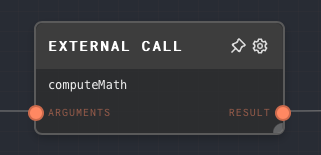External Call Node

Overview
When Rivet is running from a host application running @ironclad/rivet-core or @ironclad/rivet-node, then you can attach "External Functions" when running graphs or creating a GraphProcessor. The following external function sum will sum all of its arguments:
import { runGraphInFile } from '@ironclad/rivet-node';
await runGraphInFile({
...etc,
externalFunctions: {
sum: (...args) => {
return {
type: 'number',
value: args.reduce((acc, curr) => acc + curr, 0);
}
}
}
})
You can then call these external functions from within a graph using the External Call node. The function to call is configured in the editor for the External Call node, and must match the name of the function you passed to externalFunctions when running the graph.
External functions are useful for many use-cases, they can do things like:
- Get data from your database
- Call web APIs
- Get user information about who is running the graph
- Anything else you can think of!
External functions are extremely powerful. They can only be used when running Rivet from a host application, and are not available when running Rivet in the Rivet applicaton. The external function nodes will error when running in the Rivet application. Use Remote Debugging to run External Call nodes in the Rivet application.
- Inputs
- Outputs
- Editor Settings
Inputs
| Title | Data Type | Description | Default Value | Notes |
|---|---|---|---|---|
| Arguments | any or any[] | The arguments to pass into the external call. | (empty array) | To pass in multiple arguments, they must be an array. You can use an Array Node to create an array of any data. |
Outputs
| Title | Data Type | Description | Notes |
|---|---|---|---|
| Result | (any) | The value returned from the external call. | Can be any data type, make sure you're returning what you expect! |
| Error | string | If the external call errors, will be populated with the error message. | Only enabled if Use Error Output is turned on. If Use Error Output is turned off, the node will error instead. |
Editor Settings
| Setting | Description | Default Value | Use Input Toggle | Input Data Type |
|---|---|---|---|---|
| Function Name | The name of the external function as defined in externalFunctions. Must match the function name defined in your code. | (empty string) | Yes | string |
| Use Error Output | If enabled, then the External Call node will not fail, but instead any error will appear in the Error output port of the node. If disabled, the entire External Call node will error if the call errors. | False | No | N/A |
Example 1: Make a database call from a graph
In this example, we'll create a graph that makes a database call to get metadata about a single user. First, we'll define the external function that will make the database call:
import { runGraphInFile } from '@ironclad/rivet-node';
const db = {
async getUser(id: string) {
return {
name: 'test user',
};
},
};
await runGraphInFile({
...etc,
externalFunctions: {
getUser: async (userId: string) => {
const user = await db.getUser(userId);
return {
type: 'object',
value: user,
};
},
},
});
Then, in your graph, create an External Call Node, and set the Function Name to getUser. Create a Text Node and set the text to the user's ID. Connect the Text Node to the External Call Node. The graph should look like this:

Run your application, and connect the Remote Debugger to it. Then, run the graph. You should see the object returned from the database call in the External Call node.
Error Handling
If the external function errors, then the External Call node will error. If you want to handle errors in the graph, then you can enable the Use Error Output setting. This will cause the External Call node to not error, but instead pass the error message to the Error output port. If the Error port is populated, then the Result port will not be ran. You can use an If Node to check if the Error port is populated, and handle the error accordingly.
FAQ
Q: Can I use external functions when running Rivet in the Rivet application?
No, external functions are only available when running Rivet from a host application. Connect the Remote Debugger to your host application to run external functions in the Rivet application.
Q: What do I return from an external function?
You must return a valid Data Value with a valid Data Type, for example to return a string:
{
type: 'string',
value: 'hello world',
}
Q: Can I return a Promise from an external function?
Yes, you can return a Promise from an external function. The External Call node will wait for the Promise to resolve before continuing.
Q: How are external functions different from raising events?
External functions are synchronous, and can return data. Raising events are asynchronous, and cannot return data. The Raise Event node will not wait for the event to be handled before continuing, while the External Call node will wait for the external function to return before continuing.